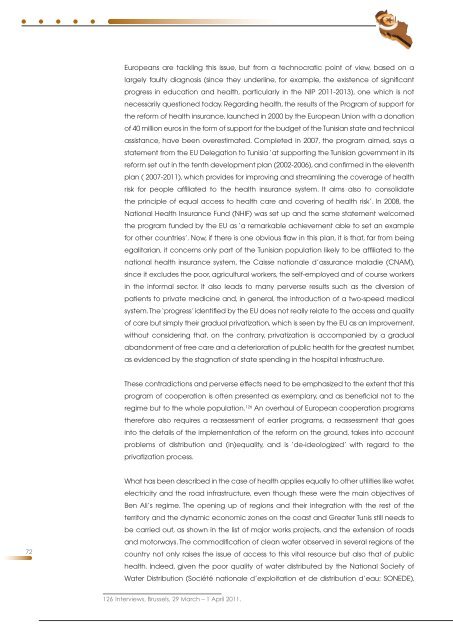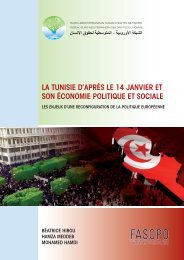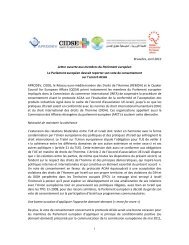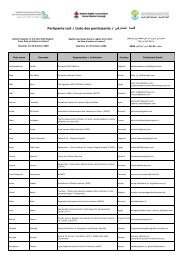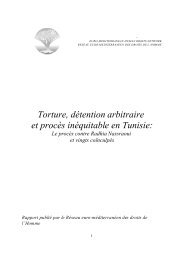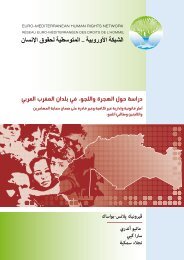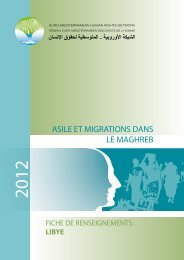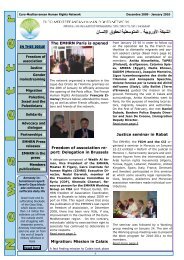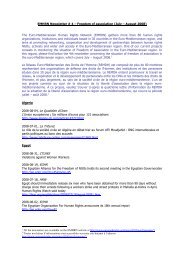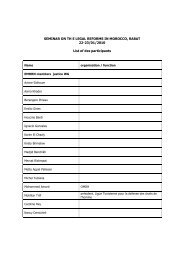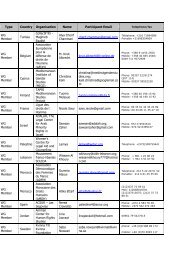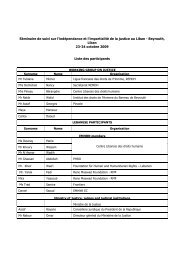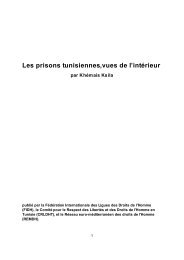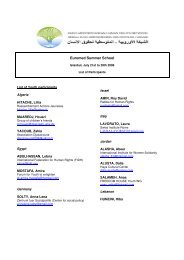tunisia after 14 january and its social and political economy - Refworld
tunisia after 14 january and its social and political economy - Refworld
tunisia after 14 january and its social and political economy - Refworld
You also want an ePaper? Increase the reach of your titles
YUMPU automatically turns print PDFs into web optimized ePapers that Google loves.
Europeans are tackling this issue, but from a technocratic point of view, based on alargely faulty diagnosis (since they underline, for example, the existence of significantprogress in education <strong>and</strong> health, particularly in the NIP 2011-2013), one which is notnecessarily questioned today. Regarding health, the results of the Program of support forthe reform of health insurance, launched in 2000 by the European Union with a donationof 40 million euros in the form of support for the budget of the Tunisian state <strong>and</strong> technicalassistance, have been overestimated. Completed in 2007, the program aimed, says astatement from the EU Delegation to Tunisia ‘at supporting the Tunisian government in <strong>its</strong>reform set out in the tenth development plan (2002-2006), <strong>and</strong> confirmed in the eleventhplan ( 2007-2011), which provides for improving <strong>and</strong> streamlining the coverage of healthrisk for people affiliated to the health insurance system. It aims also to consolidatethe principle of equal access to health care <strong>and</strong> covering of health risk’. In 2008, theNational Health Insurance Fund (NHIF) was set up <strong>and</strong> the same statement welcomedthe program funded by the EU as ‘a remarkable achievement able to set an examplefor other countries’. Now, if there is one obvious flaw in this plan, it is that, far from beingegalitarian, it concerns only part of the Tunisian population likely to be affiliated to thenational health insurance system, the Caisse nationale d’assurance maladie (CNAM),since it excludes the poor, agricultural workers, the self-employed <strong>and</strong> of course workersin the informal sector. It also leads to many perverse results such as the diversion ofpatients to private medicine <strong>and</strong>, in general, the introduction of a two-speed medicalsystem. The ‘progress’ identified by the EU does not really relate to the access <strong>and</strong> qualityof care but simply their gradual privatization, which is seen by the EU as an improvement,without considering that, on the contrary, privatization is accompanied by a gradualab<strong>and</strong>onment of free care <strong>and</strong> a deterioration of public health for the greatest number,as evidenced by the stagnation of state spending in the hospital infrastructure.These contradictions <strong>and</strong> perverse effects need to be emphasized to the extent that thisprogram of cooperation is often presented as exemplary, <strong>and</strong> as beneficial not to theregime but to the whole population. 126 An overhaul of European cooperation programstherefore also requires a reassessment of earlier programs, a reassessment that goesinto the details of the implementation of the reform on the ground, takes into accountproblems of distribution <strong>and</strong> (in)equality, <strong>and</strong> is ‘de-ideologized’ with regard to theprivatization process.72What has been described in the case of health applies equally to other utilities like water,electricity <strong>and</strong> the road infrastructure, even though these were the main objectives ofBen Ali’s regime. The opening up of regions <strong>and</strong> their integration with the rest of theterritory <strong>and</strong> the dynamic economic zones on the coast <strong>and</strong> Greater Tunis still needs tobe carried out, as shown in the list of major works projects, <strong>and</strong> the extension of roads<strong>and</strong> motorways. The commodification of clean water observed in several regions of thecountry not only raises the issue of access to this vital resource but also that of publichealth. Indeed, given the poor quality of water distributed by the National Society ofWater Distribution (Société nationale d’exploitation et de distribution d’eau: SONEDE),126 Interviews, Brussels, 29 March – 1 April 2011.


